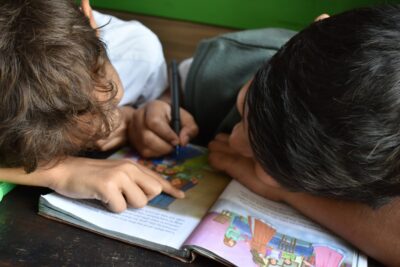St Dympna’s Primary School has achieved the Inclusive School Award with Flagship status.

Nurturing School
St Dympna’s is a Primary School in the Omagh area in County Tyrone. It has 213 pupils and has placed a strong emphasis on being a nurturing school that is community focused.
From the minute you arrive at St Dympna’s Primary School, you are struck by the friendly and welcoming atmosphere. Displays in the reception and corridors acknowledge the achievements of pupils both inside and outside school. There is a strong focus on pupil voice, with additional displays showing the members of the council and eco committee. There is a genuine emphasis on ensuring that everyone’s talents are recognised and that there is a place for everyone.
A ‘lunch time league’ display showed not only the football players but also the ‘stats guy’, ensuring that even pupils who are not keen on sport can aspire to be part of the fun. Staff talked about the school’s inclusive, nurturing and respectful ethos being, “fostered by staff who model”. The school is busy and purposeful, with pupils enjoying Irish lessons, Art Therapy and a baby visit during the assessment visit alongside their regular classroom lessons. The school displays its Flagship award with pride and references it in its promotional materials.
Values Every Single Pupil
St Dympna’s Primary is a school that values every single pupil and ensures that appropriate supports and interventions are put in place as required. The Acting Principal has great insight into every pupil and their needs. She talked with great depth about the supports available and how they are managed and reviewed for effectiveness. Up for discussion was the ‘Reading Partnership’ approach, where the 14 Classroom Assistants have been trained and are providing three sessions per week of one-to-one support for pupils. This is monitored closely, with testing at the beginning and end of each term. Our Assessor heard how this ‘boost’ has been extremely effective for pupils and has developed their competence and confidence. Newcomer pupils are valued, and staff go out of their way to ensure that they find out about the countries their pupils come from. Members of staff aim to ensure that the emotional needs of these pupils are prioritised. One of the school’s Classroom Assistants described, “how wonderful it is to see a child go from an unreachable state of panic to one where they are happy and playing”.
The school has made great progress in developing its nurturing ethos. This is clear in every aspect of the school, including displays, timetabling, curriculum flexibility and resourcing. Staff are positive and pupil-focused, working hard to meet the needs of every child. Their delight in every achievement shone through and it was clear just how much value they placed on the nurture and care they provide. All staff see the need to first meet pupils’ emotional needs to enable them to reach the best state they can be in to learn, and they talked knowledgeably about the need to meet sensory needs through a range of approaches including movement. They are creative in their approaches, for example, talking about how dance involves pupils in, “following directions, you are part of the team”. There is also a lovely sense of enjoyment of learning and staff spoke about the need to make it fun. The school wishes to embed nurturing principles and has made great gains with this. All pupils observed were engaged and benefitted from the adaptations made for them.
Holistic Needs of the Pupils

The tour of St Dympna’s Primary School showcased just how every space is used to meet the holistic needs of the pupils. Shared areas have been developed to meet the needs of the pupils in nearby classrooms and nurture nooks, rooms and resources are available. The school values their outdoor areas as much as indoors and has developed these with the needs of the pupils in mind. Displays reflected the school’s focus on nurture and wellbeing, for example, one beautiful display related to a book about managing your worries. Classroom displays were equally positive and engaging, showcasing pupil work and making clear the expectations of pupils.
Staff relationships are positive and productive, with a real sense of everyone working together in the best interests of the pupils in their care. It was impressive to see how much staff are willing to go ‘above and beyond, particularly in the current context of Action Short of Strike that affects both teaching and non-teaching staff in Northern Ireland. The Acting Principal talked about the ‘give and take’ that exists, with staff feeling valued and supported to perform their role. She sees the work of the subject co-ordinators as “invaluable”, and they continue to make strong contributions to whole school development. Staff talked about the relationships and trust between them and the fact that, “nobody feels they know best”. Staff will collaborate on a whole school basis to meet pupil needs, for example, realising that one pupil is overwhelmed by the friendly greetings they usually provide on arrival. The staff now give the pupil space and time and have witnessed the benefits of this.
What was also clear was that the relationship with local cluster schools is a genuine one that is strategically beneficial. St Dympna’s has gained and provided support to other schools and has ensured that their expertise has been shared beyond their setting. This is a school that is active in the community and that wants to further develop its work with cluster schools, parents and beyond. The school makes excellent use of its newsletter to celebrate and showcase learning and has further plans for developing its presence and communication.
St Dympna’s Primary School takes a pupil-focused approach to assessment. They have high expectations and want every child to reach their full potential. In addition to standardised tests, they use a variety of assessments as appropriate for specific pupils/Year groups including ones related to emotional wellbeing and outdoor play. The Vice-Principal discussed the use of photos and videos on the interactive whiteboard to help the youngest pupils engage in self-assessment.
What stood out from the assessment visit was what one staff member described as the desire they have to, “be curious” about the emotional wellbeing of pupils. The staff all talked about the need to see each child as an individual and to ensure that if ever a pupil is facing challenges, they work hard to identify the cause and find a way to support them to be the best they can be. This positive approach to supporting pupils with their behaviour means that challenges are overcome as a team, with staff, parents and pupils working together. This, combined with the school’s monthly focus on positive traits, makes for a positive environment where pupils are mannerly, focused and engaged.
Works Hard to Engage with Parents

The school works hard to engage with parents and to provide information, support and training that is relevant to them and their children. It was lovely to hear from a parent about the impact the school’s nurture work has had on her son and his experiences of school.
St Dympna’s is a school that not only meets the needs of pupils during their time in Primary School but also prepares them for post-primary school life. The Acting Principal teaches Year 7 and devotes the third term of the school year to a theme called ‘Are You Wise?’ The pupils learn to make choices and explore topics including mobile phone use, food, money management and harmful substances. They learn about navigating the practicalities of post-primary schools such as using cashless canteens and this helps pupils feel they “know what is going to be ahead of us”. The links the school has fostered with other schools in the community are extremely beneficial to both staff and pupils.
The Acting Principal showed great insight into the best way to continue making progress as a team. She discussed how the school will ‘step back to go forward together’, reviewing teaching and learning and ensuring that all staff have the same high level of competence and confidence as they progress with whole school development.
Our assessor added, “It was a genuine privilege to spend the day in such a warm, inclusive setting and to meet with staff who displayed so much commitment to the pupils and enthusiasm for their work.”
Find out more about the IQM Inclusive School Award
If your school is interested in obtaining the IQM Inclusive School Award or you wish to talk to a member of the IQM team please telephone:
028 7127 7857 (9.00 am to 5.00 pm)
or email: [email protected] for further details.
Want more information on the IQM Award? Click here to request your free IQM information pack.